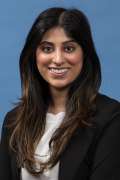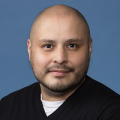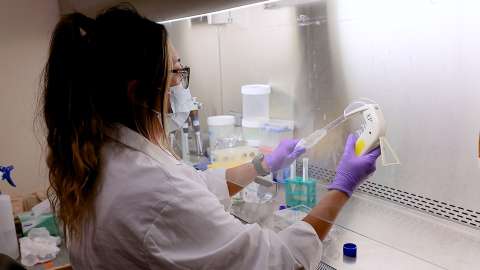Stroke & Vascular Neurology
The UCLA Vascular Neurology Fellowship was founded in 1996 and expanded into an ACGME-accredited program in 2004.
The Fellowship Program in Vascular Neurology affords extensive experience in clinical vascular neurology as well as clinical research training. This one-year fellowship is designed to provide comprehensive, state-of-the-art clinical and research training within a well-rounded competitive academic training environment.
Meet our Team:

Kyle Kern, MD
Program Director
[email protected]

Associate Program Director

Sahar Rupani
Education Office Director

Oscar Arellano
Program Coordinator
Program Faculty
For a list of all our Faculty, go here.
Current Fellows
For a list of our current Fellows, go here.
Program Alumni
For a list of our program's Alumni, go here.
How to Apply
Interested applicants can apply by going to the Electronic Residency Application Service (ERAS) to fill out an application. Applicants may begin submitting applications through ERAS on November 12, 2025.
The following are the required supporting application materials to the ERAS Common Application Form:
- Curriculum Vitae
- Personal Statement
- Three letters of recommendation, one of which should be from your Neurology Program Director
- USMLE scores for parts 1, 2 and 3 (photocopies are acceptable)
- Medical school transcript and/or MSPE, if available
- For foreign medical school graduates:
- ECFMG certificate
- Visa status and visa sponsorship sought
We participate in NRMP's Vascular Neurology Match. The deadline for Rank Order List certification is April 15.
Eligibility:
Acceptance to the program is contingent upon completion of an ACGME accredited neurology residency training program.
Applicants must have a California medical license prior to starting their fellowship training. Eligibility criteria are listed on the Medical Board of California website.
Housing
A wide range of housing choices are available within a short commute. Fellows are eligible to apply for university-sponsored housing, which includes options for married fellows and those with children. All fellows receive a $1000/month housing stipend above salary.
Some of the more popular neighborhoods that residents and fellows have chosen include Westwood, West LA, Santa Monica, Mar Vista, Culver City, Beverly Hills, and West Hollywood. However, trainees have also chosen to live further away, including in the San Fernando Valley and the South Bay.
Other Resources
- Salary and Benefits: ACGME Salary and Benefits webpage
- UCLA Graduate Medical Education (GME) Prospective Residents and Fellows website
- Resident contract: UCLA Resident Contract (PDF)
- GME Summary: Summary (PDF)
Contact Information
UCLA Department of Neurology
Education Office Staff
[email protected]
310-825-6681
Rotations and Clinical Sites
ROTATIONS
The fellowship consists of clinical rotations on both the inpatient stroke service and in outpatient stroke clinic, including ample elective and protected research time. Ronald Reagan UCLA Medical Center, Olive View-UCLA Medical Center and the VA Greater Los Angeles serve as sites for the vascular neurology fellowship. The diverse patient populations at each site offer unique educational and research opportunities.
Ronald Reagan UCLA Medical Center (Joint commission certified Comprehensive Stroke Center)
Ronald Reagan UCLA Medical Center is a 520-bed hospital and Joint Commission-certified Comprehensive Stroke Center. Training at RR UCLA provides fellowship experience with patients in a major tertiary and quaternary hospital, which naturally brings diverse pathology ranging from LVO strokes treated with endovascular thrombectomy, to cerebrovascular complications of major cardiac surgery, to rare causes of stroke such as RCVS or CNS vasculitis. The stroke team has a joint consult and primary service. Vascular neurology fellows provide 24-hour coverage of the acute stroke neurology service. The stroke neurology team consists of the vascular neurology attending, the vascular neurology fellow, a PGY3 neurology resident, 2 PGY2 neurology residents and 2-3 medical students. Stroke patients admitted to RR's 24-bed closed Neuro-ICU are co-managed by the Stroke and Neurocritical Care teams. The Stroke service also has a close partnership with the Internal Medicine Consult service, who assists with the management of non-neurologic comorbidities for most primary stroke patients. In addition, there are two half-days of stroke clinic held weekly at RR, supervised by Vascular Neurology faculty.
Olive View-UCLA Medical Center
Olive View-UCLA Medical Center is a 377-bed Los Angeles County Hospital serving the San Fernando Valley and Antelope Valley, with core values of integrity, inclusivity and compassion. It offers fellows experience working with underserved communities, and practicing cost-effective medicine. With patients from all over the world, the differential diagnoses are broad, including a host of rheumatologic and tropical diseases. Fellows serve as consultants in a leadership role - residents on inpatient service and in clinic present to the fellows as they would to an attending. Acute stroke management is done via telemedicine, providing a training experience directly applicable to community practice. The telemedicine, consult-only structure of this rotation affords fellows plenty of time to engage in research projects and other elective endeavors.
VA Medical Center
Training at the West Los Angeles Veterans Affairs Medical center includes inpatient and outpatient vascular neurology care. The medical center includes 130 acute-care beds and an on-site inpatient rehabilitation unit. On the inpatient stroke service, fellows serve as a consultant for acute stroke codes and higher-level management of vascular neurology cases. A lower patient volume and consultant role allows for more one-on-one learning with the stroke attending and ample time for research and quality improvement projects. Fellows will interact frequently with the Neurology resident team in teaching and patient care. The VA system provides excellent long-term continuity for veterans with stroke, and fellows staff a twice-weekly Greater Los Angeles VA Stroke Clinic for hospital follow-ups and referrals from throughout Southern California. Fellows will present cases at joint conferences with neuroradiology, vascular surgery (for carotid procedures), cardiology (for PFO closure), and neuropsychology. Fellows on the VA elective rotations get the opportunity to observe the process of stroke recovery and have plenty of protected time to engage in research endeavors of their interest.
Fellows will have increasing responsibility during the year for supervising the Code Stroke Team, managing an array of available diagnostic imaging techniques, directing IV thrombolysis, and assisting with acute endovascular interventions. The program encompasses the spectrum of cerebrovascular disease, from critically ill patients with acute stroke to the rehabilitation and secondary prevention of stroke.
Fellows receive intensive clinical training in the diagnosis and treatment of cerebral infarction, transient brain ischemia, and brain hemorrhage. Core training also includes:
- Participation in a multihospital clinical trial program encompassing novel cytoprotective, antithrombotic, and hyperacute thrombolytic and endovascular treatment trials.
- Management of cerebrovascular patients in dedicated Stroke Unit, 24-bed Neurointensive Care Unit, Emergency Department and outpatient settings.
- Unique educational experience tailored within our Vascular Neurology subspecialty elective pathway
- Performance and interpretation of carotid duplex and transcranial Doppler ultrasound leading to qualification for neurosonology certification.
Elective Rotations
Fellows are free to use their elective time however they see fit, including but not limited to:
- Neuroradiology
- Neurointerventional
- Neurocritical Care
- Mobile Stroke Unit
- NeuroRehab at the California Rehabilitation Institute
- VA PM&R Clinic for Botox
- Research
Educational Conferences
Fellows across all clinical sites are granted protected time to participate in regularly scheduled conferences. Many of these conferences are interdisciplinary collaborations with providers from other specialties whom the department works together with closely.
- Neurovascular Conference
7:30 am every Friday morning - Fellows have the chance to discuss diverse and complex cases with experts from neuroradiology, neurosurgery, neurointerventional, and neurocritical care. This conference is held weekly and is well-attended by faculty from all involved specialties, making it a great forum for review of imaging (including IR cerebral angiography images) and discussion of challenging management decisions. - Vascular Neurology Conference
2nd Thursday of each month - Invited speakers discuss a variety of topics related to Vascular Neurology. Fellows have the unique opportunity to extend invitations to experts in Vascular Neurology of their choice from around the world, and this conference has a track record of drawing distinguished speakers presenting cutting-edge developments in the field. - Stroke Journal Club
4th Thursday of each month - Two new studies relevant to cerebrovascular diseases are reviewed among neurology trainees and faculty. Fellows have the freedom to select pertinent studies within their interest to be discussed at this conference. - Stroke and Vascular Surgery Conference
3rd Wednesday of each month - This joint case conference between Stroke Neurology and Vascular Surgery reviews recent cases of extracranial arterial disease. Fellows will learn to select appropriate intervention cases and present the clinical history and neuroimaging features. Cases will be discussed among faculty, fellows, and trainees to share perspectives of the surgeons and the stroke team to determine next steps in management. - PFO Closure Conferences
Joint conferences organized by Interventional Cardiology and Vascular Neurology, during which the teams discuss cases to come to a consensus treatment decision for patients being considered for PFO closure. During this conference, stroke fellows will present clinical and neuroimaging features while the interventional cardiologists share TTE/TEE findings and management approaches. These conferences occur every other month at UCLA and quarterly at the VA and provide unique exposure to echocardiography and education on high-risk cardiac features pertinent to stroke care. - VA Cerebrovascular Cognition Conference
This didactic conference between VA Neuropsychology and Neurology occurs quarterly for faculty and trainees to discuss unique cases of cerebrovascular cognitive impairment, highlighting the utility of neuropsychometric testing in managing and tracking recovery of cognitively eloquent strokes and other cerebrovascular diseases.
In addition to local conferences at UCLA, all fellows are granted protected time and funding to travel to the International Stroke Conference in February of each year.
Research and Clinical Trials

All fellows meet with a faculty mentor at the beginning of the academic term to develop research projects that are conducted over the course of the year. Most rotations have substantial (>50%) built-in elective time that fellows can use to engage in research activities. Fellows have a strong track record of having research accepted for presentation at international conferences, including the International Stroke Conference and World Stroke Congress, and many fellows go on to publish their findings in peer-reviewed publications.
UCLA’s core stroke faculty have diverse research interests and can provide mentorship on projects spanning much of the field of Vascular Neurology. Collaborative research with UCLA’s leading interventional neuroradiology and neurovascular surgery services includes studies of cerebral angioplasty, catheter administered thrombolysis, vascular malformations, carotid endarterectomy, and other conditions. Moreover, UCLA is actively participating in over one dozen stroke-related clinical trials and prospective research studies – both site-initiated and multi-institutional (via collaborations with NIH StrokeNet and industry sponsors) – and all fellows gain plenty of clinical research experience identifying and recruiting patients for these trials. Formal didactic teaching provides additional training in neuroepidemiology, outcomes research, clinical trial design, and biostatistics. Ample additional research opportunities are tailored to fellow interest and, in addition to the above, may include studies of:
- Neuroimaging in acute stroke care
- Stroke systems of care and the mobile stroke unit
- Vascular cognitive impairment, post-stroke cognitive impairment, and dementia
- Neuromodulation in acute stroke
- Neuromodulation in stroke recovery
Get to know one of our state-of-the-art research labs. This profile features Dr. Jason Hinman, Associate Professor of Neurology and Vice Chair of Research for the Department of Neurology. His work focuses on identifying the molecular pathways that interface two of the most common neurologic disorders: stroke and dementia.
For more information, please visit our program's Research page.